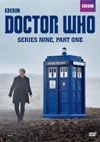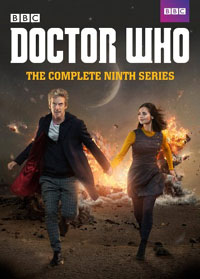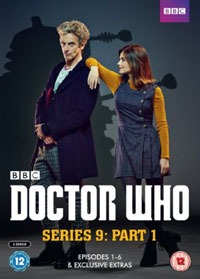DVD Extras for this story on the 14-episode box sets include:
Grabbing the InitiativeThe opening feels like a Steven Moffat grabber, a quick series of fast-paced sci-fi action beats escalating and topping each other while making clever cinematic and visual use out of a minimum of extra production resources. While this is great, it subsequently feels like a bit of a let-down when such interesting futuristic settings and problems are traded in for Vikings - who don't appear too impressive when popping up in the woods at night.But, once the production value of their village in full daylight livens up the screen, it must be said that the Viking era is touched upon rarely enough by this show that it still generates significant interest in this historical setting. Okay, this might be cool after all. Let's go for it. The "premonition" part of the opening village scene, as the Doctor spots Ashildr, is probably the only good bit we get for some time. Most of the opening revealing today's alien feels far too bog-standard to really work well, with the abattoir scene coming in as my absolute least-favourite of the entire story. However, one of the better and more important parts of the story is the scene where Clara and Ashildr get to confront the lead villain on their own, and their methods of dealing with the problem get a nice and significantly important contrast. Clara shows how clever she is when she takes the initiative to negotiate so persuasively with the lead villain, and one gets the sense that if she hadn't been interrupted, she could have resolved the entire conflict neatly at an early stage. This is one of Clara's best moments in the entire season. But, not only does Clara's performance seem to bolster Ashildr's confidence, it perhaps leads her to be overconfident, issuing some rash and ill-conceived threats of her own. Though the audience continues to get plenty of reason to like and root for Ashildr throughout the rest of the tale, this one moment reveals a darker aspect to the character which will continue to fuel ambiguity surrounding her for some time to come.... Throughout this important opening scene, the alien adversaries fail to make much impression or become very interesting themselves - a bit of a weakpoint for the story. Meanwhile, the Doctor is left behind in the village, but gets one of his better scenes here as he trades in lies for truth.
Middling AnticipationThe bulk of the middle of the story is taken up by preparations for the upcoming battle. Many adventure and sci-fi stories have made much dramatic meat out of the anticipation of huge overwhelming conflicts, with Star Trek TNG's "The Best of Both Worlds" being one of the most successful and famous. (Other examples include "The Lord of the Rings: The Two Towers", where director Peter Jackson was apparently heavily inspired by the film "Zulu".) This adventure isn't quite up to that level, with the Doctor appearing to go out of character in ways that might prove the accusations of last season's Danny Pink character to be correct. The guest characters of the village also don't get the degree of satisfying development that might occur in a two-parter, or even the very economic development that was witnessed in Jamie Mathieson's "Mummy on the Orient Express" story from last season. However, there is some satisfying mileage achieved here from all the humour of the training scenes, complete with a few successfully entertaining gags.We also get good scenes between the Doctor and Ashildr, covering a variety of moods and subjects. This is important and solid stuff, some of which will pay off in this story, some not until afterwards.... One of the more problematic aspects here concerns the monologues of translated "Baby Talk". There is probably just too much of this in the episode. Once in a while, we get something incredibly poignant out of it, so I wouldn't want to take it all out. But I'd guestimate about 50% of the "baby dialogue" has gained way too much concrete complicated detail in translation, taking its believability way down. As much as I'm all for having respect for and a willingness to learn from people of all ages, who can all demonstrate wisdom in varying ways, it almost feels like ALL levels of wisdom are being attributed to babies rather than just the ones they might actually be good at here.
Yakety PackedOnce the Doctor discovers his final clue, and the resolution of this episode begins in earnest, we pretty much get top notch, A-class scenes all the way through to the end. The expected battle is subverted in a superbly Doctorish way, exemplifying some of the best high philosophy and humour one could wish for on this show, besting less successful attempts like "The Androids of Tara" (story no. 101), or heading in the direction that "Resurrection of the Daleks" (story no. 134) so badly needed in order to make real and embody what the Doctor's argument should have been back then.And it just gets better when, layered on top, we get a bit of "Yakety Sax", perhaps better known as the Benny Hill Theme. There are entire websites out there making the point that absolutely any footage can be made humorous by adding this piece of music. Looks like Clara may have added one of the better examples in favour of that argument here. (Insert naughty Benny Hill grin emoticon here.) Had the aliens been fleshed out a little better, I might feel more confident that they wouldn't support the idea that the best way to keep Clara's footage secret was to destroy it along with the rest of the village and/or planet. They have to trust both their adversaries' word and abilities in order to decide to run home quietly at the end. But though the logic here may be a tad loose, it still holds up fairly well and satisfies. One thing I have even more difficulty buying is the idea that the technology that practically made Ashildr immortal is something lying about in the helmet of each and every one of the invaders. If they had that, how would they have any need to do any of the things they did in the story? How is it we don't have immortal Mire infesting the galaxy? How much did the Doctor alter those two medical devices? There is much that might be nit-picked about those things both now and later.... Perhaps it is significant that the TARDIS is parked two day's travel away from where the main action of this story takes place, as it may make sense of why no additional technological help was drawn forth either directly out of its labyrinth of goodies, or from any other time/space/choice location the Doctor might have decided to borrow from. And even though it does feel a bit arbitrary, I do like that we get a flashback of one of the more philosophically on-the-money moments from "The Fires of Pompeii" (story no. 195) attempting to answer a dangling question posed in "Deep Breath" (Capaldi's debut). On the one hand, it's just filling in and covering up production oddities, but since it also reinforces a philosophical direction for the stories that I like and very much approve of, this bit gets the thumbs up from me. And it's nice to be reminded of the sheer power of David Tennant's screen presence as well. The crowning glory for this episode is its very memorable final shot, a glorious impressionistic time-lapse of Ashildr and the scenic view she held so dear, while some of the immense change and sadness that the Doctor hinted at in his prior speech begins to play out across her face. This shot successfully makes you believe that you will see this character and her interesting situation in yet another Doctor Who story, and it makes you want to get to it soon. Excellent cliffhanger. Personally, I'd wished the same for Georgia Moffett's character of Jenny though, and that had so far failed to materialize. At this stage, I didn't feel that any further chapters in the Ashildr saga had been guaranteed, though thankfully, I didn't have reason to fear or any need to wait too long....
International Titles:Deutsch: "Das Mädchen, das starb"Magyar: "A halott leány (1. rész)"Français: "La Fin d'une vie"Русский: "Девочка, которая умерла"Italiano: "La ragazza che morì"Most of these titles remained literal... This time around the Hungarians decided this was the beginning of a two parter. I'll side with the Russians, who were pretty insistent that it was its own separate story.In any case, the real artistry of the titles for both this episode and the next only reach their full potential when examined together, so we'll do that on the next page....
This story is available on DVD and Blu-ray:
Bonus features include:
Comments on this article are welcome. You may contact the author from this page:
|
||||||||||||||||||||||||||||













